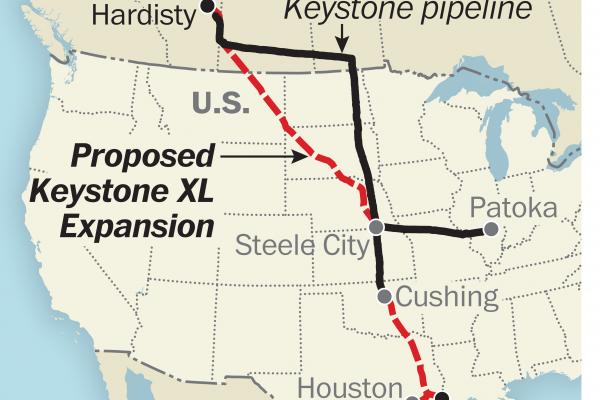Last week, the State Department issued its next draft of the supplemental environmental impact statement (SEIS) assessing the northern route of TransCanada’s Keystone XL pipeline. Officially, the State Department does not make any recommendations on whether the pipeline should be approved or denied. But the summation language is all to the positive — making it clear that the State Department still doesn’t understand global warming and its disastrous consequences.
I’m sure the scientists, policy analysts, and environmentalists among us will soon sort out and explain the hundreds of pages released by the State Department March 1. But until then, here’s the part I found most significant: “The life-cycle carbon footprint, for transportation fuels produced in U.S. refineries, would increase if the project were approved.”
Please note that this information is buried way, way, way deep in the documents. The general summary by the State Department is favorable toward industry and the pipeline, though there are some conclusions drawn that I think are not supportable.
For example, the State Department assessment is that if the Keystone XL is not approved, there is very little chance that this will stop or significantly slow TransCanada’s mining project. The State Department is basing this assessment on information from the industry, particularly the American Petroleum Institute.
However, it is not taking into account the civil resistance along the pipeline routes in both the US and Canada that is effectively blocking or slowing construction. It also doesn’t reflect what two of Canada’s largest banks, TD Economics and CIBC, have recently said that without added capacity, “Canada’s oil industry is facing a serious challenge to its long-term growth” and that “Canada needs pipe — and lots of it — to avoid the opportunity cost of stranding over a million barrels a day of potential crude oil growth.”
There is also a climate change section included in this assessment that would be laughable if it weren’t so painful. Section 4.14, Climate Change Impacts on the Proposed Project, profiles the effect of climate change on TransCanada’s bottom dollar. For example, the report looks at how increased heavy rain and flooding in areas along the pipeline route may increase TransCanada’s maintenance costs due to erosion, pipe damage, etc.
Additionally, the third-party assessor hired by TransCanada to provide an environmental and cultural impact report on the pipeline route relies on an acoustical engineer for greenhouse gas analysis.
In a Jan. 15 letter to President Obama, 18 top U.S. climate scientists urged him to reject the Keystone XL pipeline:
Eighteen months ago some of us wrote you about the proposed Keystone XL tar sands pipeline, explaining why in our opinion its construction ran counter to both national and planetary interests. Nothing that has happened since has changed that evaluation; indeed, the year of review that you asked for on the project made it clear exactly how pressing the climate issue really is.
We hope, as scientists, that you will demonstrate the seriousness of your climate convictions by refusing to permit Keystone XL; to do otherwise would be to undermine your legacy.
The Obama Administrations has promised action on climate change but if it is approved, the administration would be actively supporting and encouraging the growth of an industry that has demonstrably serious effects on climate. Once this draft SEIS has been published by the EPA, the public will have 45 days to comment on the document.
Tell the State Department to conduct a substantial, independent assessment on Keystone XL. Sign this letter to the State Department.
Rose Marie Berger, author of Who Killed Donte Manning? (available at store.sojo.net), is a Catholic peace activist and a Sojourners associate editor.
Photo: The Washington Post / Getty Images
Got something to say about what you're reading? We value your feedback!
